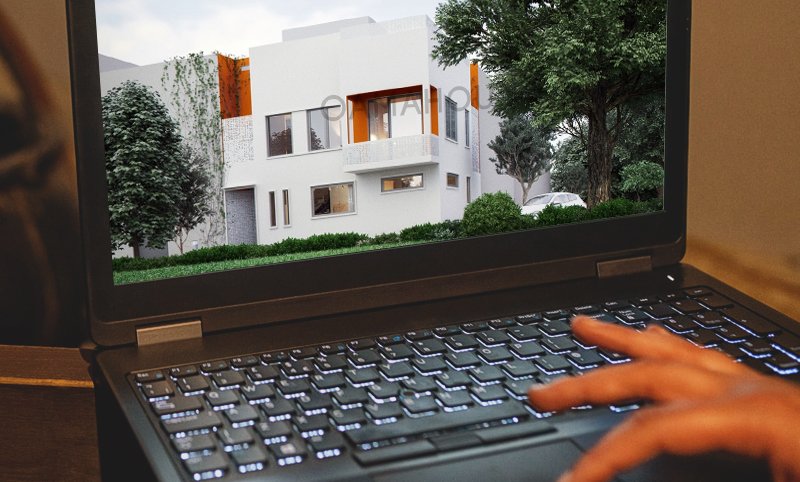You’re looking for the best laptop for 3D modeling and rendering. But not just any computer will do.
I’ve used a range of laptops myself over the years for 3D projects. So, I know exactly what works and what doesn’t when it comes to 3D modeling and rendering.
You can look at some of my 3D designs here to see what I’ve been working on.
In my opinion, the best overall laptop for 3D rendering is the ASUS ZenBook Pro Duo. If you want to find out more about this excellent laptop, read my full review below!
Buyer’s Guide to the Best Laptop For 3D Modeling & Rendering
When you’re choosing a laptop, there are a few things you need to keep in mind.
3D modeling and rendering is a rigorous and demanding process. It used to be that only big studios could create 3D rendered images.
Nowadays, there are some powerful laptops and computers capable of 3D rendering. But first of all, you need to know what to look for.
Read on to find out the essential factors of the best computer for 3D modeling.
What are the Minimum & Recommended System Requirements?
When you’re looking for a 3D laptop, not any model will do. It needs to have specific features and specs to ensure it’s suitable for the job.
When you’re working on 3D modeling and rendering, you’ll run some heavy software. You might work with Blender, Revit, 3DS Max, or other similar software.
For your computer to handle these demanding tools, it will need a robust, powerful CPU. Slower laptops for everyday use won’t cut it.
Don’t think that you can skimp on this factor. It will only cause you frustration rather than save you any money.
The next essential factor is a superb GPU. There are two reasons for this:
- Firstly, it takes some of the stress off the CPU. That will allow your computer to run more smoothly.
- Creating detailed 3D images is a challenging process. It requires a powerhouse GPU to achieve good results.
When it comes to the minimum systems requirements, here’s what I recommend.
But if you have the budget, I would splash out on a computer with the recommended requirements. These specs will give optimal performance.
| Minimum Requirements | Recommended Requirements | |
| CPU | 9th Gen Intel Core i7 | 10th Gen Intel Core i7 |
| GPU | Dedicated NVIDIA graphics card | 6 GB NVIDIA GeForce 2060 |
| Screen Size | 15.6-inch display | 15.6-inch display with FHD |
| RAM | 16GB | 32GB |
| Storage | 512+ GB of SSD Storage | 1TB of SSD Storage |
| Battery Life | 4+ hours | 6+ hours |
How Much RAM do I need for 3D rendering?
If you’re just getting started with 3D rendering, I would recommend a laptop with at least 16GB of RAM.
But the more RAM you have, the more smoothly your computer will run. A high RAM lets your computer access information quickly.
So, if you’re running several apps at once or heavy programs, you’ll need all the RAM you can get. That is especially true for professional 3D modeling and rendering.
The more advanced your software and processes are, the higher RAM you should have. If you take 3D rendering seriously, go for a computer with at least 32 GB of RAM.
You won’t regret making this investment in your tech.
Is a gaming laptop good for 3D rendering?
You might be wondering if a gaming laptop is good for 3D rendering. There are short answers and long answers to that question.
In short, a gaming laptop is suitable for most 3D rendering, as it has the powerful GPU required. So if you’re learning the ropes, you can get started with a gaming laptop.
But when it comes to the most advanced 3D rendering, even a gaming laptop won’t cut it.
At this level, we’re talking about professional software and AI-assisted rendering. That requires greater customizability and a more robust CPU than gaming computers provide.
Gaming isn’t as demanding on the CPU. So, gaming laptops won’t have the most powerful CPU.
So, in this case, you should look for a workstation laptop instead. This type of computer packs enough power in the CPU and the GPU to handle 3D rendering with ease.
The Pros and Cons of using a laptop for 3D rendering
If you’re choosing a new computer for 3D rendering, you might wonder whether to go for a laptop or desktop computer.
Laptops have improved a lot in recent years, with some very powerful models around now.
So, what are the pros and cons of using a laptop for 3D rendering?
One of the biggest pros of a laptop is portability. This factor allows you to travel and work from anywhere.
It could be as simple as working on your project while commuting or from your favorite cafe. Or, you could even become a digital nomad and work from an exotic location like Bali.
You can also meet with clients and show them samples from your laptop. It makes it much simpler to update them on your progress.
A laptop is more lightweight, compact, and portable than a desktop.
But to get the power and specs necessary for 3D rendering, you’ll have to spend a lot on a laptop. Workstation computers will often work out less expensive.
What’s the Difference Between a Desktop and Laptop for 3D Rendering?
Laptop and desktop computers differ in several ways when it comes to 3D rendering.
3D rendering is a time-consuming process that can take anywhere from hours to days. The intensive work causes your computer to heat up, which can be a problem for many laptops.
Because of their design, laptops often don’t have a built-in cooling system. Desktop computers are much more efficient at cooling down to prevent overheating.
If you’re embarking on a lengthy 3D rendering project, you could cause your laptop to burn out. That’s why I recommend a desktop for bigger projects.
A laptop is suited to small 3D rendering tasks you can do on the go. But for heavy work, it’s better to rely on a workstation computer.
Secondly, laptops tend to rely more on HDD storage, which isn’t optimal for rendering.
Desktop computers tend to have more storage space. Plus, you can add extra storage if necessary.
That ties in with another essential factor to consider: customizability.
With desktop computers, you can create a self-build computer that meets your needs. It’s cheaper to customize it and adapt it to make it faster and more powerful.
Due to the heavy demands of rendering, you can go through storage drives regularly. On a desktop computer, it’s easier to swap out the drive.
But laptops aren’t as simple to customize. So, you’ll need to spend more up-front for the same features and specifications. And it might not last as long, either.
As a result, desktop computers tend to be both more powerful and economical.
Having said that, there are some excellent laptops out there now. You just need to know what you’re looking for.
These specific models rival the power and performance of almost any desktop computer.
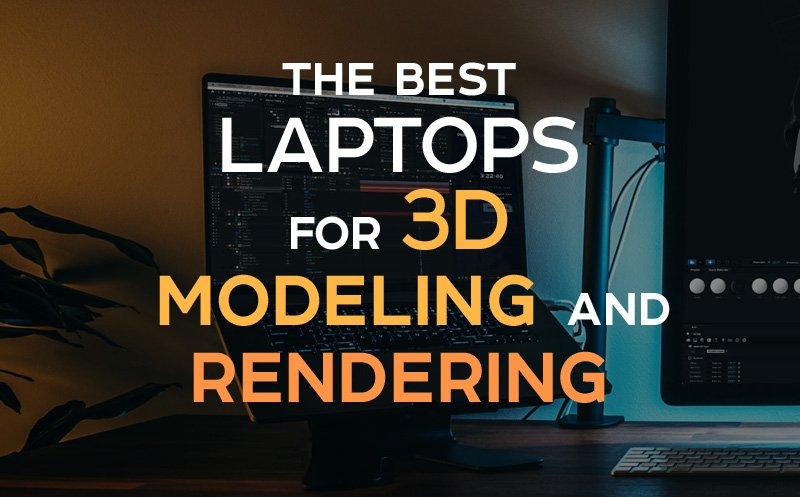
The Best Computer for 3D Modeling
Now, you know everything there is to know about 3D modeling and rendering. Here’s my roundup of the best laptops and computers for 3D rendering!
Asus ZenBook Pro Duo
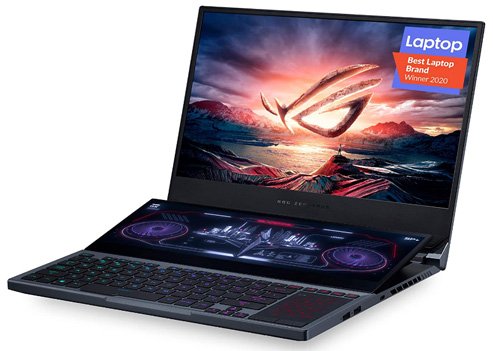
(Images credit: Asus)
If you’re looking for a top-of-the-range 3D computer, check out this Asus workstation laptop. It excels in every aspect, from the robust and lightning-speed processor.
The Intel Core i9 CPU is about as good as it gets when it comes to speed and performance.
The ZenBook Pro Duo is worth considering if you want to manage all your rendering in-house. The eight cores provide enough power for all your rendering and modeling needs.
Plus, you also get incredible 5GHz clocking speeds and multithreading technology.
This laptop will help you to produce outstanding animations and meet your deadlines. It can run complex programs like Maya and VRay with ease.
The 4K UHD screen is startlingly precise, with gorgeous visuals. No matter how skilled you are, your creations will look even better on this display.
But all these factors come at a price. The Asus ZenBook Pro Duo is one of the most expensive laptops on this list.
If you have the cash to spare, this laptop would be a wise investment in your business. You won’t regret it!
Specs:
| CPU | 2.4 GHz Intel Core i9 9980HK |
| GPU | 6GB NVIDIA RTX 2060 |
| RAM | 32GB |
| Storage | 1TB SSD |
| Display | 15.6-inch 4K OLED (3840 x 2160) |
Pros
- A premium laptop with superb specs and features
- Super-fast and powerful, with tons of storage space
Cons:
- Very expensive
MSI GL65 Leopard
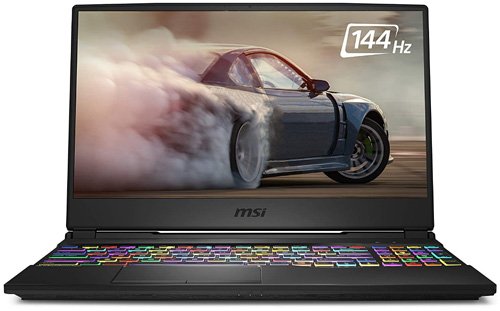
(Images credit: MSI)
While the MSI GL65 Leopard is described as a gaming laptop, it’s also suitable for 3D modeling. It even has the power and performance to handle intensive rendering.
This unassuming laptop is packed with impressive specs and an incredible display.
The 15.6-inch FHD screen is ideal for working on detailed, intricate designs. With a 100% sRGB color gamut, your creations will look crisp, vivid, and amazing!
The powerful GPU allows you to work on all sorts of 3D models, from architecture to animations.
Combine the 2.6 GHz Intel Core i7 processor with the dedicated NVIDIA GPU, and you’ve got a winning combination.
It doesn’t disappoint in storage space. You get 512 GB of SSD storage when you buy, with the option to upgrade if necessary.
One thing worth mentioning is that the battery life is lacking.
This laptop will only hold out for a maximum of 4 hours. That can limit you if you’re working on the go, as you’ll need to stop and charge your batteries.
It’s also pretty bulky and not very compact, weighing in at almost 5 pounds.
So, the MSI Leopard is best suited as an office laptop with the occasional trip out. You can work from a cafe or on your commute, so long as you plug in beforehand.
In conclusion, it’s not really a work-from-anywhere laptop due to the short battery lie. But as for the specs, this laptop is ideal for beginner or professional 3D artists.
You can use most 3D software seamlessly and without delay. Plus, the Cooler Boost 5 technology ensures it won’t overheat. Even during long rendering sessions!
And as 3D laptops go, it’s very reasonably priced. That makes it a great investment but also accessible to anyone on a tighter budget.
Specs:
| CPU | 2.6GHZ Intel Core i7 10750H |
| GPU | 8GB NVIDIA RTX 2070 |
| RAM | 16GB |
| Storage | 512GB SSD |
| Display | 15.6-inch FHD (1920 x 1080) |
Pros:
- An affordable 3D laptop
- Plenty of storage space and an excellent display screen
Cons:
- The battery life can only last 4 hours
Razer Blade 15
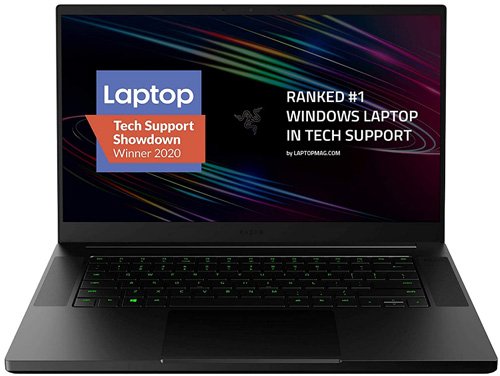
(Images credit: Razer)
This sleek, super-slim laptop has more to offer than just an elegant and portable design.
The impressive specs and features make it one of the best laptops for 3D modeling and rendering.
It meets all the requirements of a 3D designer. From the huge SSD storage to the 15.6-inch high-definition display, it ticks the right boxes.
While the GPU isn’t the most powerful out there, it can handle most design and modeling software.
The 6-core processor also packs a punch so that you can render most of your projects right from your laptop.
The Razer Blade 15 has a 10th Gen Intel Core i7 CPU. It can hold its own against anything but the most premium models with the latest i9 processor.
The battery life is pretty reasonable at up to 6 hours on a full charge. That offers you plenty of time to work on the go, giving you greater flexibility.
If you’re looking for a 3D laptop to use as your main workstation, consider buying the Razer Blade 15. It’s by far the most compact and portable option, measuring just 0.78 inches.
Specs:
| CPU | 2.6GHz Intel Core i7 10750H |
| GPU | 8GB NVIDIA RTX 2070 |
| RAM | 16GB |
| Storage | 512GB SSD |
| Display | 15.6-inch FHD (1920 x 1080) |
Pros:
- A fantastic portable laptop
- Lightweight yet powerful
Cons:
- You might want more RAM for larger rendering projects
ASUS ROG Strix Scar
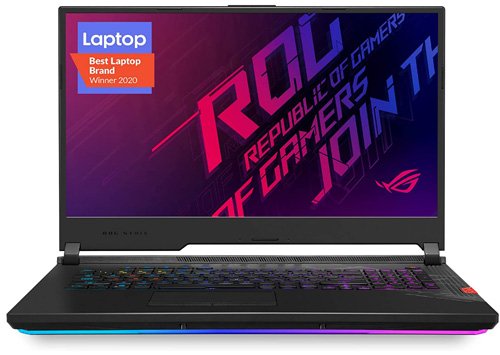
(Images credit: Asus)
The ASUS ROG Strix Scar is another fantastic laptop.
While it’s marketed as a gaming laptop, it’s also an excellent choice for 3D designers. It’s capable of handling all your 3D modeling and rendering needs.
The most notable feature is that incredible 17.3-inch FHD screen. The larger screen allows you to see all your designs in amazing detail.
The super-fast 300Hz refresh rate prevents any lags or delays as you work on your 3D models. Factor in the NVIDIA GeForce GTX 10 GPU, and this laptop excels at graphics and animation.
While the processor isn’t the most powerful, the 10th Gen Intel Core i7 is still up to the job. You can render your animations quickly on the ASUS ROG Strix Scar.
The Intelligent Cooling system will ensure that your laptop doesn’t overheat. So, the Strix Scar can handle even the most intensive projects.
There’s also enough space for a lot of files and animations, thanks to the 512 GB SSD. And if you want more space, you can expand this storage up to a total of SSD.
So, there’s massive potential with the Strix Scar for 3D modeling and rendering. The advanced features and specs make it an ideal workstation laptop for your 3D work.
Specs:
| CPU | 8th Gen Intel Core i7 |
| GPU | NVIDIA GeForce GTX 10 |
| RAM | 32GB |
| Storage | 512GB SSD |
| Display | 17.3-inch (1920 x 1080) |
Pros:
- Massive FHD screen with a fast refresh rate
- The smart cooling system prevents overheating
Cons:
- This laptop is quite heavy
MSI P65 Creator
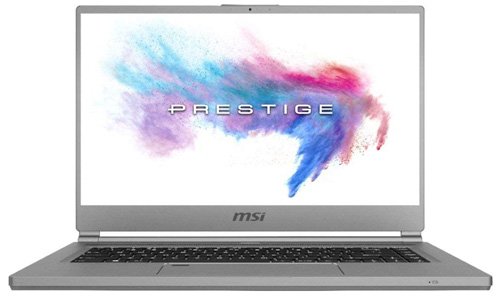
(Images credit: MSI)
The MSI P65 Creator stands out for its fantastic price and comprehensive features. It’s the perfect laptop for a 3D designer who values both the specs and the cost-efficiency.
First of all, both the CPU and the GPU are robust and powerful. With this laptop, you get an Intel Core i7 processor. The base clocking speed is excellent at 2.6Ghz
Factor in the NVIDIA RTX 2060 GPU, and you have a winning combination. These features allow you to run advanced rendering software without any issues.
Rendering should be fast and efficient, as it can rely on both the CPU and GPU’s power for better results.
Plus, you get 1TB of SSD storage. That’s an insane amount of storage space that’s also super quick to access, speeding things up even more.
So, you’ll have no problem storing and processing large animations, games, and video files.
The final piece of the puzzle is the generous 32 GB of RAM. Add in the gorgeous UHD display, and there’s nothing to fault in this stellar laptop.
And you get all that for a very reasonable price when it comes to a 3D workstation laptop. The MSI P65 Creator is one laptop you won’t have any regrets buying!
Specs:
| CPU | 2.6GHz Intel Core i7 9750H |
| GPU | 6GB NVIDIA RTX 2060 |
| RAM | 32GB |
| Storage | 1TB SSD |
| Display | 15.6-inch 4K UHD (3840 x 2160) |
Pros:
- Outstanding specs for power, performance & precision
- Can handle intensive rendering software
Cons:
- The speakers aren’t the best for this price
More Helpful Resources about Rendering & Modeling
When it comes to the best 3D software for your laptop, there are two programs I recommend.
The best 3D modeling software for laptops
If you use your laptop for 3D modeling, go for either Corona Renderer or VRay. They are the most optimized and compatible programs for laptops.
Both Corona Renderer and Vray give excellent results on laptops. But at the same time, they aren’t too demanding for your computer.
However, it’s worth mentioning that using a laptop is not an optimal setup for heavy 3D rendering. You’ll need a better long-term solution if you’re working at a professional level.
A desktop computer is still the best solution. The reason is that it’s more powerful, faster, more customizable, and cost-effective.
You’ll save money in the long run and can adapt the computer to your specific needs. Check out my recommendations for the best desktop computers.
The best render farms
The rendering process can take a long time if you’re working from a laptop. You’re looking at days instead of hours for hefty projects.
And during this time, your laptop will be out of action. Rendering is so intensive that it will take over the capacity of your computer. So you won’t be able to get anything else done while you wait.
But there is an effective way to speed up this process. You can use a render farm to handle the time-consuming work of rendering your animations.
A render farm is a system of computers (or ‘render nodes’). They work simultaneously to generate your 3D designs. This cuts down the time you’re waiting around for the finished product.
Each render node has all the specialized software necessary to render your designs. That means you won’t need to invest in any rendering software yourself.
Online render farms are an extra expense, but using one will get your rendering done as quickly as possible.
In the meantime, you can get to work on a different project as your laptop isn’t out of action. So, it can be a wise investment that will boost your productivity and output.
Here are some of the best render farms right now:
These websites get the best reviews for their user-friendly and fast service.
- RenderNation – Efficient, affordably priced rendering with fast turnarounds.
- Garage Farm – Professional-level quality & excellent customer service.
- Render Rocket – An affordable and user-friendly option.
- SummuS – Great value for money and fantastic photorealist results.
- Ranch Computing – Offers a range of plans and pricing options suitable for any project.
The Wrap Up
Choosing the best laptop for 3D modeling and rendering isn’t an easy decision to make. Your laptop will affect your workflow and process.
Going for the wrong computer could result in frustration, tears, and wasted money. That’s why you need to select the best laptop that’s up for the job.
The best computer for 3D modeling will be powerful and speedy, with plenty of storage space. It should also have a dedicated NVIDIA graphics card and a large display.
Take your pick from this list of specialized computers. I’ve narrowed it down to the best laptop workstation options out there. So whichever one you go for, you can be sure you’re making a wise decision!
The all-around best laptop for 3D rendering would have to be the Asus ZenBook Pro Duo. That’s the laptop to go for if money is no issue!
But if you’re looking for an affordable 3D laptop with excellent specs, I recommend the MSI P65 Creator.
Click the links to find out more and buy your new 3D computer. Then, let me know in the comments which one you chose!
If you found this article helpful, feel free to share it on social media. And don’t forget to sign up for the Proactive Creative newsletter! I’ll keep you updated on all my top tips and resources for creative professionals.
This post contains affiliate links. Proactive Creative may receive a small commission at no additional cost to you if you make a purchase.

